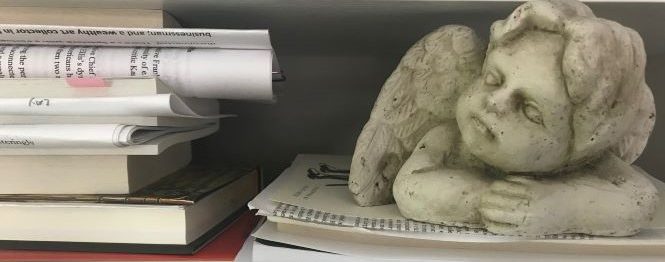I just finished reading The Master by Irish author Colm Tóibín, a novel that’s on my self-directed summer reading list. It’s a deeply absorbing character study, seductively entrancing for the way Tóibín takes us into the solitary mindset of his 19th century protagonist, American author Henry James. I’ve now moved on to a handful of books with a common thread, that of being written by women whose work is now largely forgotten. Also, the books all happen to have been written during or about the World War II era. I didn’t intentionally seek these similarities; the books came together by chance.

Madeleine Bourdouxhe (1906-1996) published her first novel La Femme de Gilles in 1937 to great acclaim, and then she disappeared from the literary world, mostly due to the onset of World War II. An active member of the Resistance, Bourdouxhe refused to continue working with her French publisher, Éditions Gallimard, that had been taken over by the Nazis; however, she continued to write, eventually publishing a second novel and a collection of short stories. They received minor attention, though, even in her native Belgium. A rediscovery and resurgence of interest have brought Bourdouxhe back into print, and let me tell you, La Femme de Gilles, published by Melville House Neversink Library and translated by Faith Evans, doesn’t let go once you begin reading. The alluring narrative trembles with insistence, and being a short novel (a novella, in other words) you can read it in one sitting. Although, like me, you may want to draw it out, the story of Elisa who grieves her husband’s manic lust for her younger sister, Victorine. Don’t for a moment think this is a typical fictional love affair. Elisa decides to wait out the betrayal, more strategic then pathetic, and I didn’t see the end coming.

British author and journalist Mollie Panter-Downes (1906-1997) wrote more prolifically than her Belgian contemporary, including novels, short-story collections, and the “Letter from London” for The New Yorker. The Letter began as a report during World War II but continued thereafter, through 1986, meeting a weekly 1,500-word deadline. Panter-Downes worked from her cottage in Surrey, England, amidst a busy domestic life. This I learned from the introduction to Good Evening, Mrs. Craven: The Wartime Stories of Mollie Panter-Downes. I discovered this delightfully enticing book via a British blogger’s review (read it here) and became intrigued by Panter-Downes’ focus on British women’s reactions to wartime living — the viewpoint of housewives, widows, Homefront volunteers, and, in one particularly poignant story, of a girl who gets pregnant on her honeymoon. Her sister says, with “derisive amusement:”
You know, only rash creatures like you and Philip would think of starting a family right slap in the middle of Armageddon.
As of this writing, I’m into the 1940 stories. The collection begins with the first story, published in The New Yorker, dated October 14, 1939, and ends with the last one, December 16, 1944. These are uncomplicated, colorful snapshots, each sparkling with Panter-Downes’ dry humor and her illuminating periscope into what it’s like at home, not on the battlefield, day in and day out. London publishing house Persephone Books has published a gorgeous edition of Good Evening, Mrs. Craven. The smooth textured paper and editorial attention to detail make this book-as-object a gem. The inside cover is a design called “Coupons” (1941-2). It’s an illustration of women’s clothes against a repeat of “66,” the number of clothes coupons allowed a year during the war, with the number needed per item.

I’d not heard of British novelist Olivia Manning (1908-1980) until I read about The Balkan Trilogy in the recent June 4 Times Literary Supplement (read the article here). Similar to Panter-Downes, Manning’s trilogy concerns World War II Englanders.
After all, [Olivia Manning] spent the war years writing, not fighting, and then wrote about those years in novels about people continuing in spite of everything, to be exactly who they always were.
TLS “Austen in Nazi Europe”
The Balkan Trilogy (The Great Fortune, The Spoilt City, Friends and Heroes) tells the story of newlyweds Guy and Harriet Pringle, who arrive in Bucharest in the fall of 1939, just weeks after the German invasion of Poland. They eventually flee south to Greece, where (from the book’s description) they face a new challenge of their own, as great in its way as the still-expanding theater of war. The story draws from Manning’s personal experience, as does the follow-up Levant Trilogy, continuing with the Pringles. These are her best-known books. According to a blog post at The Paris Review (read it here), Manning felt frustrated that her novels didn’t get read and praised. You might think rediscovery by today’s readers would make her happy, but she wanted her fame while she lived. Who wouldn’t?
Reassurances from friends that talented writers were often rewarded by posterity cut no ice.
The Paris Review
The Paris Review suggests Manning was “artistically ahead of her time” and that “her spare, unsentimental, and sometimes highly original fiction” agrees more with present literary tastes. For me, there’s nothing better than an engrossing trilogy for summertime reading, so I’m looking forward to getting started.

The 1987 tv production of The Balkan Trilogy (The Fortunes of War) made Olivia Manning quite popular for some years; I read and admired her books then, as did many of my friends.
LikeLiked by 1 person
Ah, yes! I did read that the BBC did a production, which then got picked up by Masterpiece Theater. It seems like she’s gathered many readers over recent decades. I’m glad to know you and your friends admired the books!
LikeLike